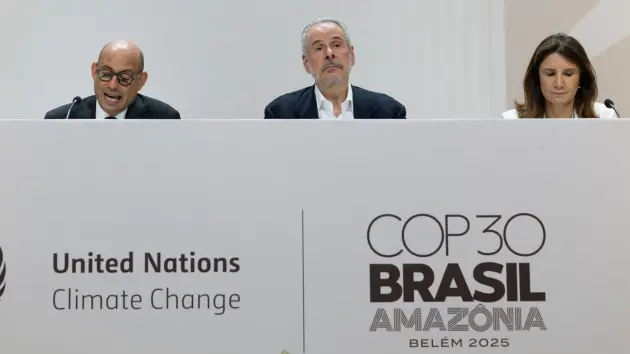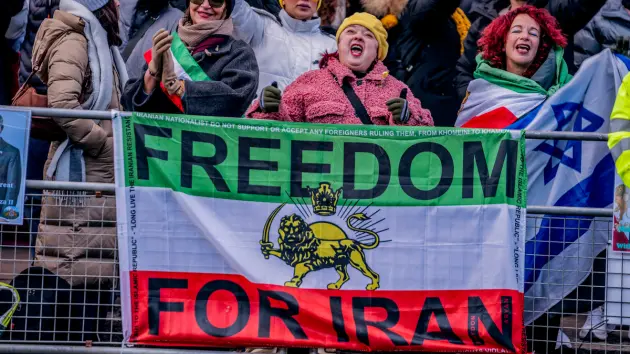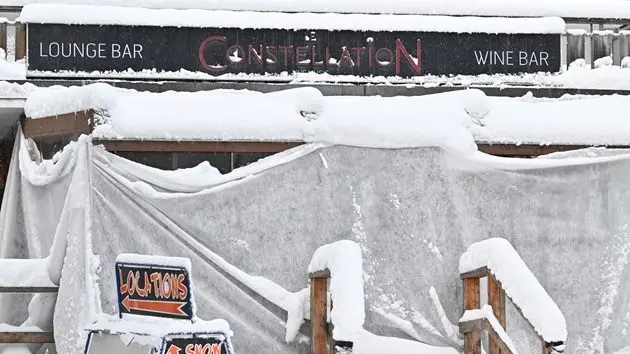
(NEW YORK) — It took an extra day, but the delegates at COP30, the U.N. annual climate conference, have reached a deal on a final agreement.
The agreement, however, falls far short of the high expectations many delegates, environmental groups and non-governmental organizations had going into the conference in Belém, Brazil.
Despite more than 80 countries calling for a roadmap to phase out fossil fuels worldwide, the primary cause of human-amplified climate change, that demand did not make it into the final text.
Although the conference took place in what’s called the “gateway to the Amazon,” the COP30 agreement also doesn’t include any significant new initiatives to stop deforestation and protect the Amazon rainforest, known as “the lungs of the planet.”
“The venue bursting into flames couldn’t be a more apt metaphor for COP30’s catastrophic failure to take concrete action to implement a funded and fair fossil fuel phaseout,” Jean Su, energy justice director at the Center for Biological Diversity, said in a statement to ABC News, referencing a fire that broke out Thursday at the COP30 venue.
“These negotiations keep hitting a wall because wealthy nations profiting off polluting fossil fuels fail to offer the needed financial support to developing countries and any meaningful commitment to move first,” she added.
Appearing to acknowledge the disappointment of some delegates and environmental and climate groups that the final agreement didn’t include the roadmaps on deforestation and fossil fuels, COP30 President André Corrêa do Lago said during his remarks during the closing plenary that he would use his authority as the COP30 president to create the roadmaps himself.
These roadmaps would not be binding, however, because they weren’t part of the approved agreement and aren’t backed by all 195 countries.
“I, as president of COP30, will therefore create two roadmaps. One on halting and reverting deforestation, another to transitioning away from fossil fuels in a just, orderly and equitable manner,” do Lago said during the final plenary session.
The World Resources Institute (WRI), an environmental research organization that sent a delegation to COP30, said that while there were some notable successes during the nearly two week conference, it didn’t deliver on what many delegates and advocates were hoping it would.
“COP30 delivered breakthroughs to triple adaptation finance, protect the world’s forests and elevate the voices of Indigenous people like never before. This shows that even against a challenging geopolitical backdrop, international climate cooperation can still deliver results,” Ani Dasgupta, the president and CEO of WRI, said in a statement to ABC News.
“But many will leave Belém disappointed that negotiators couldn’t agree to develop a roadmap to transition away from fossil fuels. More than 80 countries stood their ground for a fair and equitable shift off fossil fuels, but intense lobbying from a few petrostates weakened the deal,” she added.
The Union of Concerned Scientists (UCS) expressed disappointment that a stronger agreement couldn’t be reached but praised the delegates for making progress in some areas.
“The barely adequate outcome salvaged in the final hours of COP30 keeps the Paris Agreement alive but exposes the monumental failures of rich countries–including the United States and European Union nations–to live up to the commitments they made under that agreement,” Dr. Rachel Cleetus, senior policy director for the Climate and Energy Program at UCS, said in a statement to ABC News.
Cleetus acknowledged that the conference saw some progress in several key areas, including “a nod to tripling adaptation finance,” although she said that the specific details of how that will be implemented were left out of the text.
“On a positive note, the COP30 outcome includes a very encouraging agreement to develop a just transition mechanism to help enable a fair, funded transformation to a clean energy future with social and economic safeguards for workers and communities,” she said.
The Center for Biological Diversity praised delegates for the “establishment of a first-ever just transition mechanism for workers, Indigenous peoples and frontline communities transitioning to renewable energy economies.”
These initiatives will focus on ensuring that the shift to a low-carbon economy is fair to workers, communities, and ecosystems.
“It’s a big win to have the Belém Action Mechanism established with the strongest-ever COP language around Indigenous and worker rights and biodiversity protection,” said Su of the Center for Biological Diversity.
“The BAM agreement is in stark contrast to this COP’s total flameout on implementing a funded and fair fossil fuel phaseout,” Su added.
In his closing remarks, do Lago acknowledged that the outcomes of COP30 may disappoint many.
“I know some of you had higher ambitions,” said do Lago. “I know youth and civil society will demand we do more,” he said. “I will try not to disappoint you during my presidency.”
Next year’s COP31 will be held in Antalya, Turkey, with Australia leading the negotiations.
This rare splitting of responsibilities was part of an agreement to end a standoff between Turkey and Australia over who would host the event.
Copyright © 2025, ABC Audio. All rights reserved.



